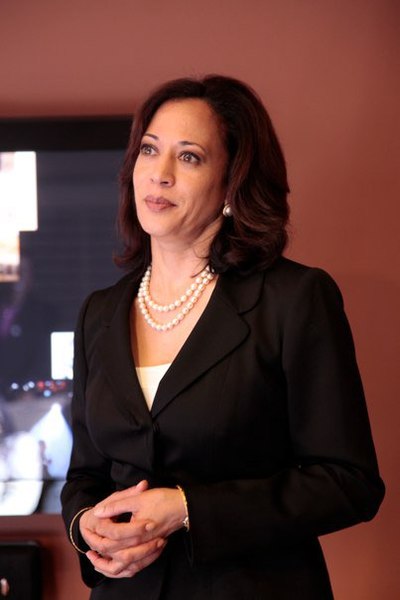7.8 Courtroom Players: Prosecutors
A prosecutor is a public official and lawyer who brings a legal case against a suspected offender. Prosecutors play a pivotal role in criminal justice and work closely with law enforcement officials, judges, defense attorneys, and probation and parole officers. They also work with victims’ services, human services, and, to a lesser extent, with jail and other corrections officers. The authority to prosecute is divided among city, state, and federal officials. City and state officials are responsible for prosecutions under local and state laws, and federal officials for prosecutions under federal law.
7.8.1 Prosecutor’s Function

Figure 7.15. Former San Francisco District Attorney and current U.S. Vice President Kamala Harris speaking at an event in 2010.
Prosecutors guide criminal investigations and work with law enforcement to procure search and arrest warrants. Following an arrest, prosecutors continue to be involved with various aspects of the investigation. A prosecutor’s roles include meeting with the arresting officers, interviewing witnesses, visiting the crime scene, reviewing the physical evidence, determining the offender’s prior criminal history, and making bail and release recommendations. They appear on pretrial motions, initiate pleas, propose diversions, extradite offenders, present to a grand jury, call witnesses, and conduct the trial. They also make sentencing recommendations. In many communities, the prosecutor is the spokesperson for the criminal justice system.
The American Bar Association (ABA) standards indicate that “the prosecutor’s [ethical] duty is to seek justice.” This standard means that the state should not go forward with prosecution if there is insufficient evidence of the defendant’s guilt or if the state has “unclean hands,” which might mean illegally conducted searches or seizures or illegally obtained confessions. Ethical and disciplinary rules of the state bar associations govern prosecutors who must follow state and constitutional directives when prosecuting crimes.
7.8.2 State Prosecuting Attorney
Prosecutors represent the citizens of the state, not necessarily a particular victim of a crime. States vary in how they organize the groups of attorneys hired to represent the state’s interest. The official with the primary responsibility for prosecuting state violations is the local prosecutor. They are referred to as the district attorney, county attorney, or state’s attorney. Local prosecutors are usually elected from a single county or a group of counties combined into a prosecutorial district. In many states, the state attorney general’s office has the authority that trumps the local prosecutors’ authority, but in practice, the state attorney general rarely intervenes in local matters.
Generally, assistant prosecutors, called deputy district attorneys, are hired as “at will” employees by the elected district attorney. Historically, the applicant’s political party was a key criterion, and newly elected prosecutors would make a virtual clean sweep of the office and hire outsiders from the former office. Now, most offices hire on a nonpartisan, merit-oriented basis. Most states require that the prosecutor be a member of the state bar.
7.8.3 Federal Prosecuting Attorney
Prosecutors in the federal system are part of the U.S. Department of Justice and work under the Attorney General of the United States. The Attorney General does not supervise individual prosecutors and relies on the 94 U.S. Attorneys, one for each federal district. U.S. Attorneys are given considerable discretion, but they must operate within general guidelines prescribed by the Attorney General. The U.S. Attorneys have several Assistant U.S. Attorneys who do the day-to-day prosecution of federal crimes. For certain types of cases, approval is needed from the Attorney General or the Deputy Attorney General in charge of the Criminal Division of the Department of Justice. The Criminal Division of the Department of Justice (DOJ) operates as the arm of the Attorney General in coordinating the enforcement of federal laws by the U.S. Attorneys.
7.8.4 Selection and Qualifications of Prosecutors
Most local prosecuting attorneys are elected in a partisan election in the district they serve. State attorney generals may also have significant prosecutorial authority. They are elected in forty-two states, appointed by the governor in six states, appointed by the legislature in one state, and appointed by the state supreme court in another. State attorney generals serve between two to six-year terms, which can be repeated. Federally, senators from each state recommend potential U.S. Attorney nominees who are then appointed by the President with the consent of the Senate. U.S. Attorneys tend to be of the same political party as the President and are usually replaced when a new President from another party takes office.
7.8.5 Licenses and Attributions for Courtroom Players: Prosecutors
“Courtroom Players: Prosecutors” by Sam Arungwa is adapted from “7.9. Courtroom Players: Prosecutors” by Lore Rutz-Burri in SOU-CCJ230 Introduction to the American Criminal Justice System by Alison S. Burke, David Carter, Brian Fedorek, Tiffany Morey, Lore Rutz-Burri, and Shanell Sanchez, licensed under CC BY-NC-SA 4.0. Edited for style, consistency, recency, and brevity; added DEI content.
Figure 7.15. “Kamala Harris photo May 20” by LAbaseballFan, Wikipedia is licensed under the Free Art License.
